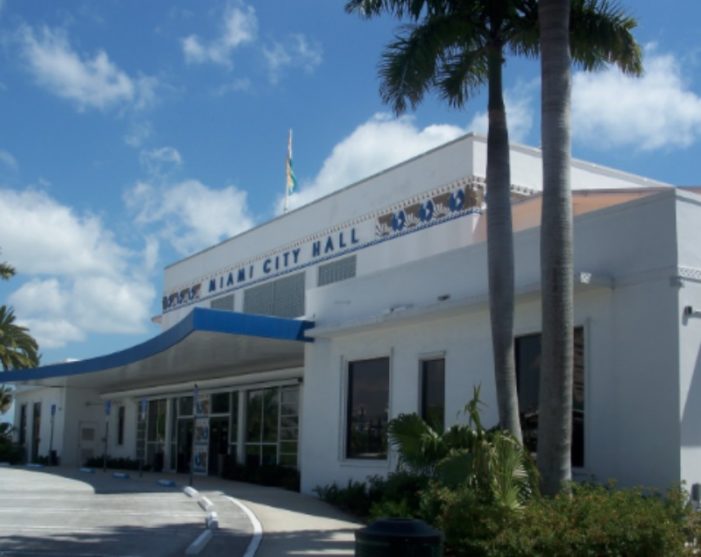Virus? What virus?
A land use change, some code amendments and the ban of certain types of fertilizer are among things the Miami City Commission will consider when it meets virtually for the second time since the national COVID19 crisis struck and the stay-at-home orders 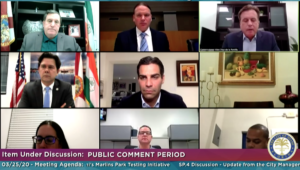 were issued. The first meeting last month was pretty much limited to coronavirus-related issues — the city’s response, supplies, meals for seniors and other needy residents.
were issued. The first meeting last month was pretty much limited to coronavirus-related issues — the city’s response, supplies, meals for seniors and other needy residents.
But on Thursday, city commissioners could discuss the Transit Alliance’s Better Bus Project and amending the code as it relates to the Audit Advisory Committee and the procurement process. Say what? There’s a second reading on an ordinance to limit food trucks by forcing a bunch of regulations on them. Really. Commissioner Manolo Reyes wants to amend the city code to require a super majority (4/5) vote to designate any structure as historic — to protect property owners who don’t want the designation. And they are likely to give final approval to the infamous information kiosks, pushed by former commissioner-turned-lobbyist and campaign funder Marc Sarnoff, after some deal was struck between different entities that were originally competing. Pero, por supuesto!
Read related: Miami-Dade commission’s first post COVID19 meeting is virtual, very full
Like the county commissioners did on Tuesday, it seems that the city commissioners are making decisions that they don’t have to make right now, especially before we know what the real cost of this crisis is and how governments are going to recover. One 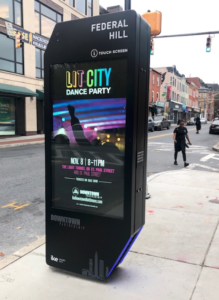 could think they are intentionally trying to do some of these things while nobody is looking.
could think they are intentionally trying to do some of these things while nobody is looking.
Example: The interactive digital kiosks — which make money by having advertising and pay a percentage to the city in order to use the public right of way — have been a bit controversial, especially because competing companies say they have been shut out of the process as Sarnoff has given tens of thousands in political contributions to at least three of the commissioners. Also because former Sen. Miguel Diaz de la Portilla — older brother to Commissioner Alex Diaz de la Portilla — signed up to lobby for one of the media companies involved in 2018. This is the kind of item that historically attracts a lot of speakers.
When Gov. Ron DeSantis waived the requirement for governments to have in-person quorums and meetings in a “specific public place,” Ladra thought it was strictly for COVID19-related issues and things that governments need to do to continue operating and serving the public. But it looks like one obligatory COVID meeting is all you need to go back to business as usual.
Don’t get me wrong. There will still be some virus talk at the virtual meeting. There’s a resolution urging the passage of the federal CoronaVirus Response Act, which ensures that “no city of Miami employee will lose his or her pay for regular or scheduled hours of employment and applicable benefits” during the declared emergency. That seems timely.
Read related: Miami commission approves COVID19 curfew, $2 mil in meals — barely
But why do they have to consider a one-year pilot program for “e-cargo bikes” to reduce traffic congestion along Brickell? Or a land use change from duplex to multi-family residential in Coconut Grove, which has already seen its share of gentrification?
“The community is very much at the table on that zoning question and it cannot go forward without an arrangement that includes 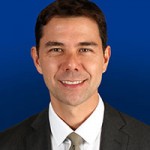 the community and affordable units in sufficient quantity and price,” said Commissioner Ken Russell, whose district includes the properties on Carter and Plaza streets.
the community and affordable units in sufficient quantity and price,” said Commissioner Ken Russell, whose district includes the properties on Carter and Plaza streets.
“It is our regular agenda that rolled over from previous agendas that have been held up,” Russell told Ladra in a text message Wednesday. “The government must continue to do our work in addition to the crisis related items. The governor’s order allows us to meet virtually — not to violate sunshine or impede public comment.”
Who else thinks public comment is impeded simply by a stay-at-home order during an existential threat?
“It also does not specify what type of times we can take up,” Russell continued. “We may be in this type of situation for the foreseeable future, so we must conduct the business of the city. It should be noted that we are offering more public comment options in this format than ever before.”
The virtual meeting can be seen live on the city’s website on Miami TV, through Facebook, Periscope, or Comcast channel 77 within the city limits. The public can make comments prior to the meeting, either by submitting a two-minute video or voice recording or submitting an online comment form, which may be live. The deadline to submit to the online form will occur when the chair closes public comment during the meeting.
But it’s not the same. Sending an email and leaving a voice mail message is different than making your plea in public. In front of their faces. City Hall is going to be open Thursday so people can make in-person comments through a computer in the lobby. One by one, abiding by social distancing standards. Diaz de la Portilla pushed for the option, saying that not everyone is adept at using modern technology to participate and not everyone has internet.
But how much you want to bet that not a lot of people take them up on that? Or maybe they want certain people to show up. Al Crespo, David Winker, Grace Solares, Chelin Duran — do not fall for it!
Even if there are highly-involved people who have something to say about the land use change or the kiosks or anything else, they have got other things to do right now — like look all over town for Lysol, teach their kids, pick up free produce in a food line and spend several hours or days applying for unemployment. Nobody. Is. Paying. Attention.
Both Russell and Diaz de la Portilla told Ladra that the zoning items will likely be deferred as they were at the last meeting. On the agenda, “may be deferred” is in big, bold letters above every one of those.
Read related: Three lobbyists appointed to Miami 21 task force draw scrutiny, complaints
But ADLP said the discussion on the approval of the new DDA Director, Christina Crespi — the old director resigned when the 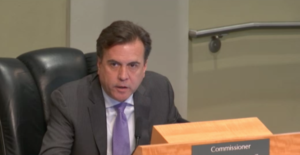 power shift gave the DDA chairmanship to Commissioner Reyes — will likely happen.
power shift gave the DDA chairmanship to Commissioner Reyes — will likely happen.
“Miami continues to lead and innovate with our virtual meetings,” The Dean said.
“We work collectively. Especially in these difficult times, Miamians can feel confident that their government is operating on all cylinders.
“We are also holding our first Omni CRA meeting to begin to move items that have been stuck in Russell’s indecisive drawer for years.”
Yes, that. That’s exactly the kind of thing that you shouldn’t be doing. If it’s waited this long, it can’t be urgent.
Ladra was also told by several sources that some of the items — permanently allowing electric scooters, for example, and the discussion on the weird deal with the contract for the cancelled Ultra Music Festival — will likely be deferred (psst, anyone: Sunshine Law violations maybe?). And not all the board appointments will be made. Some of them will be deferred.
But maybe not the planning and zoning appeals board, which recently recommended that zoning upgrades for large scale Special Area Projects (SAPs) should be rescinded. Las malas lenguas say the commission wants to completely replace them with people who are friendlier to SAPs, which generate lots of campaign contributions. This month’s PZAB meeting has been cancelled. Maybe the commission doesn’t want the current zoning board to make any more recommendations.
“We’re going to do a complete revamp of Miami 21,” Commissioner Diaz de la Portilla told Ladra. “We need to have good board members that understand urban planning models.”
Yes, okay. But do we need to have them right now?

